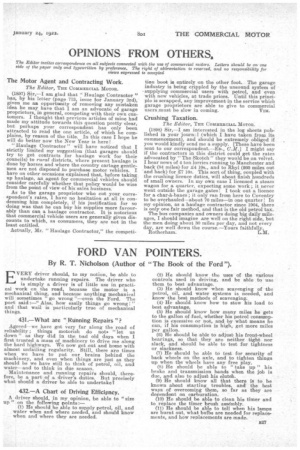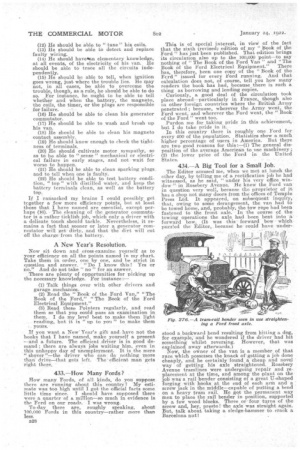FORD VAN POINTERS.
Page 23

Page 24

If you've noticed an error in this article please click here to report it so we can fix it.
By R. T. Nicholson (Author of "The Book of the Ford ").
EVERY driver should, to my notion, be able to undertake running repairs. The driver who is simply a driver is of little use in practical work on the road, because the motor is a mechanical thing, and because anything mechanical will sometimes " go wrong "—even the Ford. The poet said :—" Alas, how easily things go wrong 1" and that wail is particularly true of mechanical things.
431.—What are "Running Repairs "?
Agreed—we have got very far along the road of reliability ; things motorish do not. "let us down" as they did in the bad old days when I first trusted a mass of machinery to drive me along the hard highways. We now get out and home with almost unfailing regularity. Still, there are times when we have to put our brains behind the machinery, and even when things are just as they should be we have still to think of petrol, oil, and water—and to think in due season.
Maintenance and running repairs should, therefore, be a part of a driver's duties. But precisely what should a driver be able to undertake 1
, 432.—A Chart of Driving Efficiency.
A driver should, in my opinion, be able to "size up" on the following points:—
(1) He should be able to supply lpetrol, oil, and water when and where needed, and should know when and where they are needed.
(2) He should know the uses of the various controls used in driving, and be able to use them to best advantage. (3) He should know when scavenging of the petrol, oil, and water systems is needed, and know the best methods of scavenging.
(4) He should know how to stow his load to best advantage. (5) He should know how many miles he gets to the gallon of fuel, whether his petrol consumption is excessive or not, and by what means he can, if his consumption is high, get more miles per gallon. (6) He should be able to adjust his front-wheel bearings, so that they are neither tight nor slack, and should be able to test for tightness or slackness.
(7) He should be able to test for security of back wheels on the axle, and to tighten things up when the wheels have any free play.
(B) He should be able to "take up" his brake and transmission bands when the job is due, and also to adjust his dutch.
(9) He should know all that there is to be known about starting troubles, and the best ways of overcoming them, so far as they are dependent on carburation.
(10) He should be able to clean his timer and to replace the timer brush assinably.
(11) He should be able to tell when his lamps are burnt out, what bulbs are needed for replacements, and how replacements are made.
(12) He should be able to " tune" his coils.
(13) He should be able to detect and replace faulty wiring.
(14) He should haven elementary knowledge, at all events, of the electricity of his van. He should be able to trace all the circuits independently.
(15) He should be able to tell, when ignition goes wrong, just where the trouble lies. He may not, in all cases, be able to overcome the trouble, though, as a rule, he should be able to do so. For instance, he ought to be able to tell whether and when the battery, the magneto, the coils, the timer, or the plugs are responsible for failure.
(16) He should be able to clean his generator commutator.
(17) He should be able to wash and brush up his van.
(18) He should be able to clean his magneto contact assembly.
(19) He should know enough to check the tightnese of terminals, (20) He should cultivate motor sympathy, so as to be able to "sense " mechanical or electrical failure in early stages, and not wait for worse to happen. (21) He should be able to clean sparking plugs and to tell when one is faulty. (22) He should be able to test battery condition, "top " with distilled water, and keep the battery terminals clean, as well as the battery top.
If I ransacked my brains I could possibly get tcgether a few more efficiency points, but at least those that I have named are essential, except perhaps 06). The cleaning of the generator commutator is a rather ticklish job, which only a driver with a delicate touch should tackle. Nevertheless, it remains a fact that sooner or, later a generator commutator will get dirty, and that the dirt will cut off the charge from the battery.
A New Year's Resolution.
Now sit down and cross-examine yourself as to your efficiency on all the points named in my chart. Lake them in order, one by one, and be strict in question and answer. "Do I know this? Yes or no." And do not take " no " for an answer.
There are plenty of opportunities for picking up the necessary knowledge. For instance :— (1) Talk things over with other drivers and garage mechanics, (2) Read the "Book of the Ford Van," "The Book of the Ford," "The Book of the Ford Electrical Equipment." (3) Read these Pointers regularly, and read them so that you could pass an examination in them. I do my level best to make them light reading, but it is " up to you" to make them yours.
If you want a New Year's gift and have not the books that I have named, make yourself a present —and a future. The efficient .driver is in good demand; there are always jobs waiting him, even in this unhappy day of unemployment. It is the mere "shover"—the driver who can do nothing more than drive—that gets left. The 'efficient man gets right there.
433.—How Many Fords?
How many Fords, of all kinds, do you suppose there are running about this country? My estimate was too high until I got the official facts some little time since. I should have supposed there were a quarter of a million—so much in evidence is the Ford on our roads. I was wrong. 'To-day there are, roughly speaking, about 100,000 Fords in this country—rather more than less.
B28
This is of special interest, in view of the fact that the sixth (revised) edition of my " Book of the Ford" has just been published. That edition brings its circulation also up to the 100,000 point—to say nothing of "The Book of the Ford Van" and " The Book of the Ford Electrical Equipment." There has' therefore, been one copy of the " Book of the Ferd " issued for every Ford running. And that calculation does not, of course, tell you how many readers the book has had, because there is such a thing as borrowing and lending copies.
Curiously, a good deal of the circulation took place abroad—particularly in France, though also in other foreign countries where the British Army penetrated ; because, wherever the Army went, the Ford wept, and wherever the Ford went, the "Book of the Ford" went too.
Pardon me for taking pride in this achievement, but I do take pride in it. In this country there is roughly one Ford for every 400 of the population. Statistics show a much higher percentage of users in America.. But there are two good reasons for this:—(1) The general disposition of the average American to use machinery ; (2) the lower price of the Ford in the United States.
434.—A Big Tool for a Small Job.
The Editor amused me, when we met at lunch the other day, by telling me of a rectification job he had witnessed, as he said, "under his very office window " in Rosebery Avenue. HO knew the Ford van in question very well, because the proprietor of it has a.shop not many doors from the offices of Temple Press Ltd. It appeared, on subsequent inquiry, that, owing to some derangement, the van had to be towed home, and, probably, the tow rope had been fastened to the front axle. In the course of the towing operations the axle had been bent into a forward bow. (It was thisforward bow which puzzled the Editor, because he could have under stood a backward bend resulting from hitting a dog, for example; and he wondered if the driver had hit something whilst reversing. However, that was exp 1 ained away afterwards.) NOW the owner of the van is a member of that race which pessesses the knack of getting a job done cheaply, and he certainly found a cheap and novel way of getting his axle straightened. Rosebery Avenue tramlines were undergoing repair and replacement at the time, and among the plant on the job was a rail bender consisting of a great U-shaped forging with hooks at the end of each arm and a screw jack in the middle—capable of putting a bend on a heavy tram rail. He got the permanent way men to place the rail bender in position, supporte. by a few wood blocks. Three or•four turns of the screw and, hey, presto t the axle was straight again. But, talk about taking a sledge-hammer to crack a Barcelona nut I






























